‘Murina’ examines the quest for independence
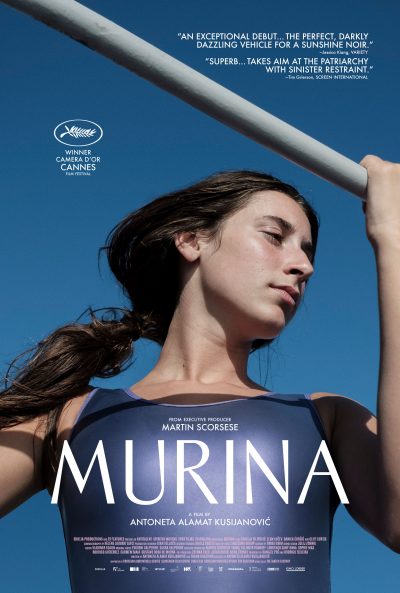
“Murina” (“Moray Eel”) (2021 production, 2022 release). Cast: Gracija Filipović, Danica Čurčić, Leon Lučev, Cliff Curtis, Jonas Smulders, Niksa Butijer, Milan Strljic, Marina Redzepovic, Klara Mucci, Mislav Cavajda. Director: Antoneta Alamat Kusijanović. Screenplay: Antoneta Alamat Kusijanović and Frank Graziano. Story: Antoneta Alamat Kusijanović. Web site. Trailer.
Life in the coastal community of a small Croatian island is frustrating for an ambitious 17-year-old like Julija (Gracija Filipović). Not only are there few opportunities for a meaningful social life or the ability to assert her budding sense of independence, but there’s also the expectation of obediently living under the thumb of the region’s pervasive patriarchal culture. In this case, that’s epitomized by the demands placed on Julija by her overbearing father, Ante (Leon Lučev). When she’s not performing household tasks for her complicitous, capitulating mother, Nela (Danica Čurčić), Julija regularly accompanies Ante on his diving expeditions to hunt moray eels in the surrounding waters. And, if she has any free time, she spends it longingly watching the fun and frolic of wealthy young tourists vacationing on their visiting yachts in the local harbor. She has her sights particularly set on a handsome young man, David (Jonas Smulders), and he occasionally returns her glances, though he appears to have eyes for one of his travelling companions (Klara Mucci), seemingly dashing Julija’s hopes. But, with so many responsibilities to attend to, she really doesn’t have time for playing those kinds of games anyways.
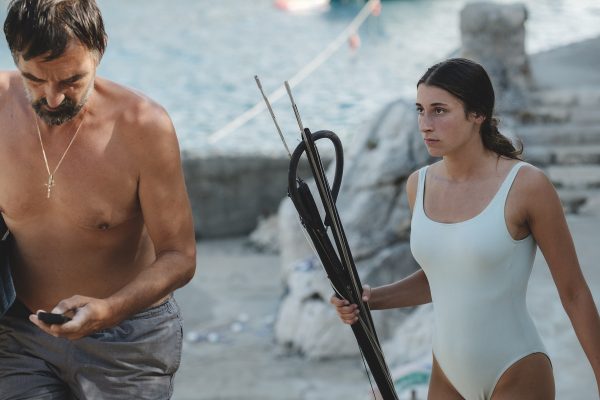
To a great degree, that’s because Ante’s demands on Julija have been particularly taxing of late. He’s preparing for a visit by an old friend, Javier (Cliff Curtis), a well-heeled property developer who’s interested in purchasing a piece of coastal land Ante owns. Javier is eyeing the property for possible conversion into a resort, and Ante wants to do all he can to make a good impression to close the deal. He believes that selling the land could provide him with a windfall that would enable him to move his family to Croatia’s capital, Zagreb, and the prospect of a better life. But can that dream realistically be fulfilled?
Javier’s arrival is marked by a festive reception at Ante’s home. But it also sets in motion a series of events that disrupts the family’s life in various ways. For starters, he shamelessly flirts with both Julija and Nela. Julija relishes the attention and sees his interest in her as a possible ticket out of her current circumstances. For Nela, however, it’s an opportunity to rekindle an old flame, having once been romantically linked to the visitor, even to the point of having considered marriage to the suave, handsome real estate mogul. And, when Julija learns this, she’s disappointed, partly because it not only dowses cold water on her plans, but also because she learns how her mother settled for her current circumstances, denying herself a chance at greater happiness and a better life than what she’s endured. That realization subsequently steels Julija’s resolve to create a better future for herself, one in which she rejects the passivity and obsequiousness that her mother allowed herself to embrace.
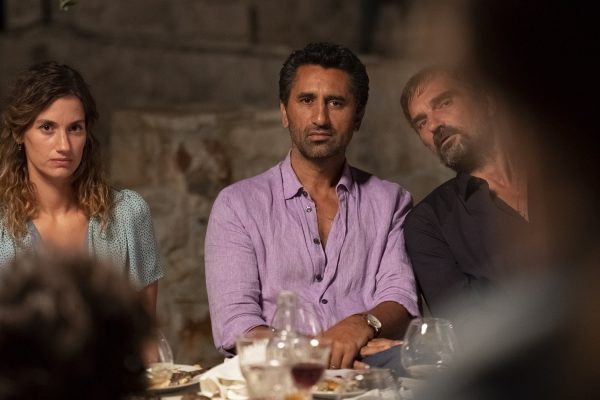
In seeking to bring this about, Julija becomes more defiant toward both of her parents, acting out and even storming off to pay a visit to the handsome young visitor on the yacht. But, while Nela may only scold Julija, Ante becomes downright abusive toward her. In part, this is due to Julija’s growing rebelliousness, but it’s also anger directed at himself for tolerating Javier’s improper behavior toward both his wife and underage daughter, all to keep his cool so that he can close the business deal.
Coming of age is often a time of challenge, but it’s generally not supposed to be as difficult as this. Is this really the kind of life a 17-year-old should have to endure? But, at the same time, as a largely inexperienced adolescent, is she truly ready to strike out on her own? Also, will she be able to keep her own composure through these trying times, avoiding rash actions and decisions that could paint her into a corner? And, even though a few would-be saviors have entered her life, do they have agendas in mind that are truly honorable or quietly sinister? Indeed, are they knights in shining armor, or are they more like the slippery eels she routinely hunts with Ante? Clearly, Julija has some big decisions to make regarding her personal well-being and the direction of her future, but is she up to the task? And, if so, what path will she choose?
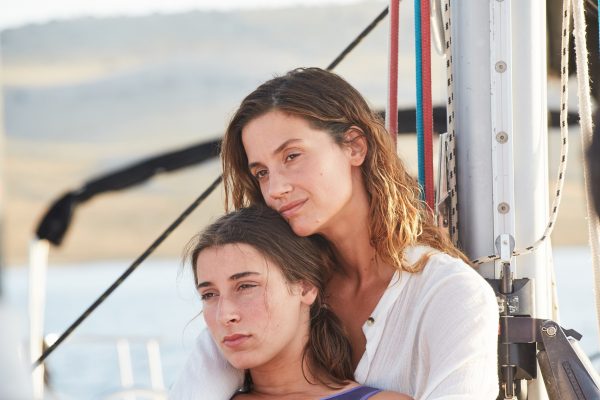
Still, considering the difficulties Julija is encountering, it might seem unlikely that she’ll escape her virtual captivity, no matter how convinced she might be. However, when we want something badly enough, sometimes it takes arduous conditions to galvanize us in our beliefs to a point where we adhere to them so strongly that we’re successfully able to bring them into being. And, given what she’s undergoing, it would seem she’s succeeded in creating the very circumstances necessary to make that outcome possible, counter-intuitive though that may appear to some of us.
Think for a moment what she’s manifested around her – a demanding father who’s constantly placing undue pressures on her, a mother (and, one might think, role model) whose apathy exemplifies the exact opposite of what Julija’s trying to attain for herself, and two potential liberators who seem to have the power and the means to take her away from everything she’s grown to despise. When fusing the ambition of a strong-willed individual like Julija with these increasingly unbearable conditions, what kind of outcome should we expect from such a volatile combination? Indeed, how content is Julija likely to be in continuing on under these conditions, especially given her youthful exuberance, determination and sense of conviction?
Julija’s outlooks, beliefs and subsequent actions have placed her in good stead to move forward toward achieving her objectives. Her willingness to further pursue them thus provides her with opportunities to strengthen these “metaphysical muscles,” giving her a greater sense of personal confidence and enabling her to bolster her faith in her manifestation skills, all of which bring her closer to the fulfillment of her goals. Despite the “rebelliousness” that comes with such ventures, who can realistically find fault with that? There’s much to be said for becoming who we choose to be, even if it ruffles some feathers along the way.
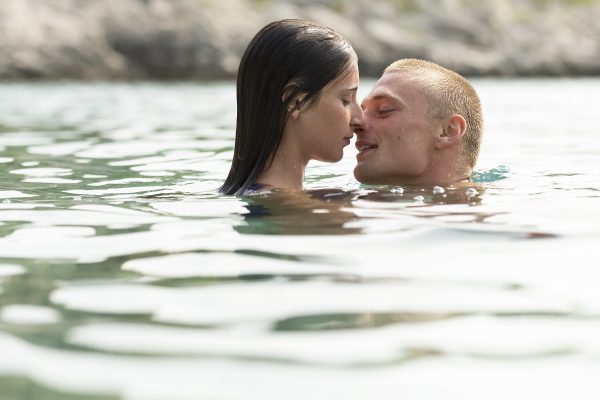
Considering what this process ultimately makes possible, it’s hard to believe that anyone would take issue with what it’s designed to do. Ante and Nela, for example, have both created what they want for themselves (no matter how much any of us might disagree with their choices), so why should they be upset that their daughter has sought to do the same for herself? Shouldn’t parents want their children to realize their dreams, what’s often seen as what’s best for them? True, there might be conflicts when those objectives contradict one another, but isn’t one of the widely accepted responsibilities of parents to see that their children grow up to be independent and self-sufficient enough to support themselves upon leaving the nest? How can that happen when their efforts are thwarted by those who won’t allow them the freedom to follow their own paths?
At the same time, it could also be argued that such domineering measures are all part of the strengthening process itself. Just as the butterfly becomes stronger by struggling to free itself from its cocoon, so it might be for children seeking to liberate themselves from their parents’ control, to help them realize their own inner strength and ability to be themselves. There’s a good chance that Ante and Nela aren’t even aware that they’re doing this where Julija is concerned. But, if such efforts help their daughter attain her personal fortitude, can they truly be faulted for helping Julija ultimately find her own way?
It’s important to recognize from the foregoing that beliefs may not always be what they appear to be. But, the better we’re able to recognize them and their underlying intents, the easier it will likely be for us to make use of the manifestation process in our lives – and to achieve the goals we hold most dear. And, if that’s not a true sense of independence, I don’t know what is.
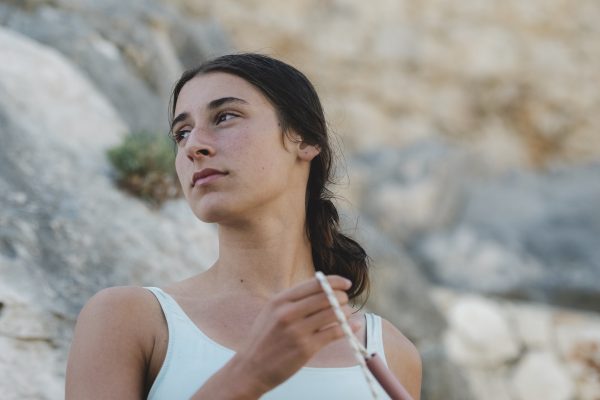
Adolescence is a time for finding oneself, especially when it comes to our sense of independence and personal power. That’s rarely easy, but it can be especially difficult for those trapped in controlling households, particularly those with chauvinistic fathers, a condition not uncommon in many traditional Eastern European families. Director Antoneta Alamat Kusijanović’s debut feature from Executive Producer Martin Scorsese presents an intense, intimate character study of these circumstances, chronicling an individual’s search for empowerment in the face of oppressive odds and confusing circumstances that, like the clandestine behavior of the moray eels she and her father routinely hunt, deceptively conceal much of what’s actually going on. This winner of the 2021 Cannes Film Festival Golden Camera Award for best first feature simmers slowly but builds tension well, engaging viewers handily, despite some repetitive narrative elements and occasional “atmospheric” camera work whose deliberate murkiness goes a little overboard in metaphorically depicting the intended character of the story.
A number of films with themes similar to those explored here have emerged from this region in recent years, such as “Hive” (2021) and “God Exists, Her Name is Petrunya” (2019). It’s a trend that some have vehemently criticized, claiming that these productions go out of their way to portray the region’s men as little more than abusive, misogynistic morons, and those complaints may have some merit from the standpoint of disproportionality. However, their creation would also serve as an indication that there must be a need for the expression of these notions, and, thankfully, filmmakers have successfully risen to the occasion, making the world more aware about conditions for women desperately in need of reform. Viewers obviously need to decide for themselves, an opportunity made possible by the release of films like “Murina,” which is available for streaming online.
Copyright © 2022, by Brent Marchant. All rights reserved.



